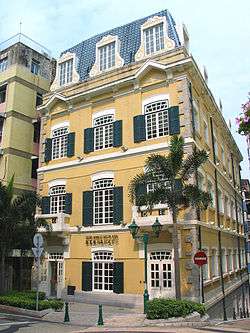Delta Asia Financial Group

Delta Asia Financial Group (Portuguese: Banco Delta Ásia S.A.R.L.; traditional Chinese: 滙業銀行; simplified Chinese: 汇业银行; pinyin: Huìyè Yínháng) is a Macao-based bank owned by the Delta Asia Financial Group and founded in 1935 by Au Wing Ngok, father of Stanley Au, the current chairman and majority shareholder.[1] It the 10th largest bank in Macao with eight branches and 150 employees.[2][3]
In March 2007, the U.S. Treasury ordered U.S. companies and financial institutions to cut links with the bank on account of allegations concerning BDA's business with the government of North Korea, which at that time kept $25 million at the bank in various accounts. The case is considered a notable use of Section 311 the USA Patriot Act to crack down on the use of the international financial system by "rogue states" and "state sponsors of terrorism".[4][5]
Although virtually every bank in Macao handled North Korean funds, U.S. regulators singled out BDA because the shutdown of a smaller bank would create less financial disruption.[6] North Korea was able to gain access to funds deposited at the bank by raising the issue with the United States at the Six Party Talks on nuclear weapons technology in Beijing. However, the bank remains under U.S. sanction and is therefore unable to conduct business in either U.S. dollars or in Hong Kong dollars.[2] The sanctions are said to have intimidated other banks from doing business with North Korea and disrupted the country's system for transferring foreign exchange.[5] Macau has responded by stepping up enforcement of anti money laundering laws.[6]
North Korea and the Six-Party Talks
The bank has been accused of engaging in money laundering and distribution of superdollars for the government of North Korea. In September 2005, the impending imposition of sanctions by the United States was announced, which triggered a massive bank run. As a result, the Macao Government invoked a banking law to replace the bank's board by government appointees.[7][8] As a result of this, several North Korean companies in Macao which had accounts with the bank, including Zokwang Trading, had their accounts frozen.[9] Kim Jong Nam, the eldest son of North Korea's leader Kim Jong Il, has lived in Macao since 2004, when the United States imposed sanctions on a bank in Macao for allegedly helping Pyongyang launder money.[10] However, the United States agreed to resolve the issue of frozen North Korean bank accounts in Macau's Banco Delta Asia if North Korea disarms its atomic arsenal.[11]
An audit by Ernst & Young commissioned by the Macao government found no evidence that the bank had facilitated money laundering.[12]
On March 14, 2007, the U.S. Treasury Department ordered all U.S. banks and companies to sever ties with Banco Delta Asia, following an 18-month investigation. U.S. Treasury Under-Secretary Stuart Levey stated that the investigation confirmed the bank's "willingness to turn a blind eye to illicit activity, notably by its North Korean-related client".[13] A mini-bank run ensued, although only 10% of the bank's cash reserves were drawn out.
In September 2007, the Monetary Authority of Macao ended its intervention and the bank was returned to management by owner Stanley Au.[2] No criminal charges were ever filed in Macau. The bank remains blacklisted by the U.S. Treasury Department and is not authorized to conduct transactions in U.S. dollars.
See also
References
- ↑ Delta Asia Financial Group
- 1 2 3 Greenlees, Donald (2007-09-29). "Blacklisted Bank to Return to Original Owner". The New York Times. Retrieved 2010-04-26.
- ↑ China Matters: Stanley Au Makes His Case for Banco Delta Asia
- ↑ IBDeditorials.com: Editorials, Political Cartoons, and Polls from Investor's Business Daily - New Sanctions, Unlike The Old, Seem To Work
- 1 2 Squeeze on Banco Delta Asia hit North Korea where it hurt - International Herald Tribune
- 1 2 Greenlees, Donald; Lague, David (2007-04-13). "Trail Led to Macao as Focus of North Korean Corruption". The New York Times. Retrieved 2010-04-26.
- ↑ "Banco Delta board yields control". The Standard. 2005-09-29. Archived from the original on 11 March 2007. Retrieved 2007-03-20.
- ↑ "U.S. Cites Banco Delta Asia for Money Laundering, Other Crimes". GlobalSecurity.org. 2005-09-15. Archived from the original on 10 March 2007. Retrieved 2007-03-20.
- ↑ "北, BDA계좌동결 후 3개국서 계좌개설" (in Korean). Joongang Daily. 2006-10-16. Retrieved 2007-03-20.
- ↑ "Kim Jong Il's Son Living In Macau". NewsMax dot com. Retrieved 2007-02-05.
- ↑ "Give and take". Boston.com World News. 2007-02-14. Retrieved 2007-02-14.
- ↑ Hall, Kevin G. (2007-02-01). "Accounting firm finds no evidence of money laundering". McClatchy Newspapers. Archived from the original on 4 March 2007. Retrieved 2007-03-01.
- ↑ "China 'regrets' US ruling on bank". BBC News. 2007-03-15. Archived from the original on 17 March 2007. Retrieved 2007-03-16.
External links
- Homepage
- Patriot Act
- Richard S. Tracey, " Using the PATRIOT Act to Turn North Korea's Dirty Money into a Bargining Chip" Strategic Studies Quarterly, Summer 2009